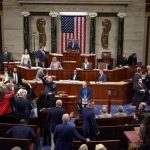The UK Government’s £330 billion coronavirus racket
A definition of “racket” (Wikipedia):
A criminal act in which the perpetrator or perpetrators fraudulently offer a service… to solve a problem that would not exist without the racket. Conducting a racket is racketeering. Particularly, the potential problem may be caused by the same party that offers to solve it, but that fact may be concealed, with the specific intent to engender continual patronage for this party.
Yesterday, through its Chancellor of the Exchequer mouthpiece, the UK Government announced measures to counteract the detrimental economic effects of a coronavirus pandemic that it claims is ravaging the British nation. In doing so, it lifted a veil so that it could be discovered being engaged in a tremendous criminal enterprise; the UK Government is racketeering on a colossal scale.
The UK Government is attempting to vandalise the economy of the British nation in order that the financier echelon that is a constituent part of UK Government (via the City of London) can prosper by offering compensatory loans to businesses which will be compelled to become indebted in order to stabilise in the context of the vandalised economy.
The vandalism, specifically, is the intended effect on business performance of so-called “social distancing” and “self-isolation”, which UK Government recommends (going so far as to issue an instruction to avoid one’s place of work), and is prepared to effect by force, to prevent the spread of a supposed infectious disease.
The reason why apparently well-intentioned measures to stop the transfer of infection between people can be characterised as vandalism is due to the fact that the disease in question, Covid-19 (coronavirus disease 19) has not been proven to exist. When people were dying of pneumonia in China, the illness was blamed on a coronavirus and called Novel Coronavirus-Infected Pneumonia (NCIP). The coronavirus that was suspected to be present and causing the pneumonia was eventually called SARS-COV-2.
If this coronavirus has been found in the 70-odd people in the UK who have now been said to have died of Covid-19 – and this has not satisfactorily been shown to be a fact – even then it is not clear that death can actually be attributed to the disease. It is not clear how many deaths have been from other issues, with the SARS-COV-2 coronavirus being coincidentally present in the host. Moreover, and perhaps more pertinently, Covid-19 is said to be a respiratory disease, but where hospital patients die having had symptoms to suggest Covid-19 in this way, it is extremely likely that these people have in fact fallen foul of pneumonia not necessarily caused by SARS-COV-2.
Therefore, the case against the UK Government is that it has grossly exagerated the danger of Covid-19, and that in reality the SARS-COV-2 is not as much a threat to life than is an annual flu virus (please see the notion reflected in the expert opinion expressed in a 3rd March corporate-media article, here). As such, there is no evidence that there is any need for social distancing or self-isolation in order to mitigate the contagiousness of so-called Covid-19. However, the exaggerated claims for the potency and virulence of the supposed disease is the means by which the Government can insist on a fundamental change in social interaction.
And it is the UK Government’s demand for alteration of behaviour that will inevitably result in less economic activity, given that people are usually intimidated by regulation and threats of punishment. Thus the UK Government, with a lie about a coronavirus, is attempting to sabotage the economic performance of any business that trades face-to-face with its customers, or brings groups or crowds of people together. Any damage to the capacity of such businesses to realise capital value in the economy will be the fault of the UK Government.
Moreover, this damage will have been deliberately inflicted in order to create demand for the service that is on offer as part of the racket. The service in this case is the compensatory relief of financial loans. The UK Government is guaranteeing at least £330 billons worth of these – equivalent to 15% of the UK’s GDP – to “any business who needs access to cash to pay their rent, their salaries, suppliers or purchase stock”. Because the Chancellor of the Exchequer, Rishi Sunak, specified that these loans would be available on “attractive terms”, it can be supposed that they will incur interest. It must also be supposed that, if the loans are “Government-backed”, borrowers will lend from banks in the usual way, but the lenders will face no risk because defaulting on the loan will be covered by tax-payers’ money. Presumably, the lenders will ultimately borrow from the Bank of England (i.e. the City of London) – and if, on the release of further details, any of this proves not to be the case, then a correction will be made.
The UK Government’s main coronavirus compensation scheme (because there are also token gestures involving small amounts in grants and mortgage payment holidays), then, will enrich the financier class (British banks being themselves components of the City of London, and therefore the UK Government) at no risk to itself.
As related at the top of this page, the beneficiary of the racket is the same as the provocateur, but this fact has to be concealed so that the racket cannot be discerned and decried in order that it can produce benefit. This is why the fact that the City of London is in essence the UK Government is a jealously guarded open secret – “open” because the fact hides in plain view; the City had a remembrancer in parliament before General Monck made a deal with it that would lead to the restoration of the Crown on advantageous terms for the City (the Crown is the front for City of London rule).
The UK Government, then, by disrupting the British economy with a fraud concerning a claim of a contagious disease, and then offering a service as a solution that will benefit its concealed self, the UK financier class, is partaking in criminal activity.
What decent people must do about this contemptible and blatant act of gangsterism is to be discussed further in subsequent FBEL articles.


















